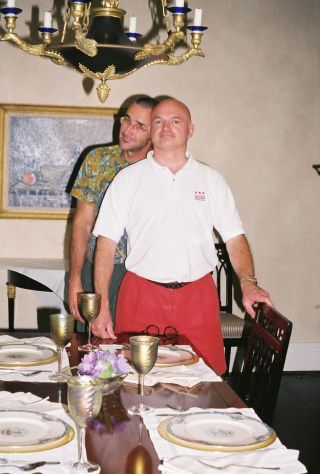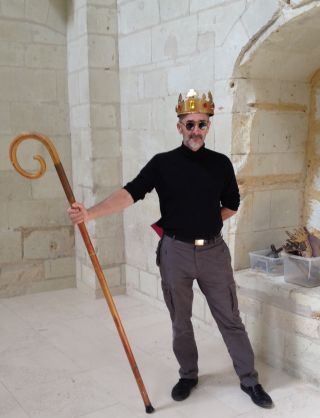Friends
Left Alone, I’ve Outlived All My Old Friends. Now What?
A Personal Perspective: One can experience grief without feeling bereft.
Posted March 5, 2023 Reviewed by Jessica Schrader
Key points
- Solitude has; loneliness wants. They are two different states of mind.
- One can experience grief without feeling bereft; not lonely, but at peace with your solitude.
- Taking up the beloved's routines can make them feel close at hand.

My husband of 26 years just died, leaving me widowed for a second time. My sole sibling lives far away, and I have outlived all my long-term friends and acquaintances, some of whom date back to my early school years.
What now, now that I am alone? What now, now that I have no support?
Many assume that the newly bereaved must be lonely. They picture those who have lost a great love bereft, sitting alone in a quiet, empty house. Who or what can fill the psychological hole left behind?
Lawyers, doctor’s offices, and official forms ask questions that are impossible to answer: Who is your emergency contact? Who will be your medical power of attorney when urgent decisions need to be made and your nearest relative lives hours away? New arrangements will take time to figure out. Do I even have time?
Meanwhile, loneliness sets in—or so people imagine. Too often people mistake solitude for loneliness, but they are entirely different states of mind: Loneliness wants, solitude has. Solitude can be a full, rewarding, comforting space. But loneliness is always dissatisfied with present conditions, frequently needy, and often frightened.
One can experience grief without feeling bereft: not lonely, but at peace with your solitude. Memory can console if you focus on what you’ve had, not on what you have lost. A close, affectionate relationship leaves behind a highly particular context that is full of distinct, exacting memories that can sustain a person for a lifetime.
It is impossible for me to feel sad when each memory of what Stephen and I did, the places we went, the people we met, and the life we built brings a smile to my face rather than tears.
Two Large Personalities
Stephen and I met at a party. My previous companion had died of AIDS, and I had also lost dozens of friends in the first wave of the epidemic, before the release of the life-changing protease inhibitors. I had been in mourning for a while. But then I committed myself to going out, showing my face, and accepting whatever invitations came my way.

At midnight I prepared to leave the party, whereupon Stephen bounded up and asked, “Are you hungry?” to which I hesitated and said, “I could be.” The early a.m. conversation that ensued over pancakes and eggs lasted nonstop for the next three decades.
It soon became clear that a two-bedroom apartment was not enough to contain two large personalities. We bought a house, a four-floor stucco affair with a red tile roof. It gave us plenty of elbow room and one floor each for a home office. We split up household duties, me taking responsibility for the inside, Stephen for the outside. A new life took root and began to grow.
Many people go through life never having once felt romance, the buoyant, head-over-heels experience that psychology calls limerence. The initial feelings of walking on air and obsessive thoughts of the beloved dissipate over time, of course, but they are replaced by an attitude that is much more abiding.
I have been fortunate to have had the experience of deep, abiding love twice. My first husband wanted to “loosen me up,” to get me out of my head and have my heart shine more. We were still smitten when he died barely two years later. Then Stephen entered my life and continued to loosen me up, taking me to my first rock concert at the age of 40.
Fast forward to his metastatic lung cancer, which he lived with for more than four years (the average survival is 11 months). When he realized his chances for a longer survival were slim, he worried and told his oncologist, “Richard’s going to be all alone with no one to look after him.” After his death, the oncologist shared something that Stephen had told him in private: “Looking after Richard gives my life meaning and purpose.”
This is what makes me weep. I weep when I read that sentence because it is so beautiful coming from a man so fantastically accomplished himself. How can I feel empty when I have 26 years of memories from spectacular trips around the globe, absurd encounters that still make me laugh, and far-flung people met by the force of his openness, loquaciousness, and quick wit—and then to be reminded on top of it that I have been loved so well?
Initially, I assumed nothing could replace the quiet of his absence. But I was wrong. I’ve taken over some of his routines, like flying a different flag every day. He had a collection that numbered over 400 of them—flags for states, flags for cities, for countries, municipalities, the European Union, the Paleo Asti, even Vatican jurisdictions. None of them is labeled. He knew them all by heart.
Now I am learning them one by one. I am taking care of the outside now, too, including the garden. Whether flying a flag or digging in the soil, I feel him close at hand.




